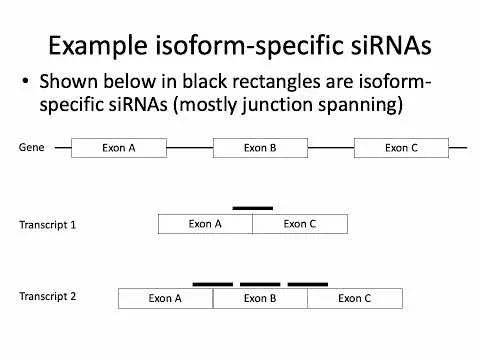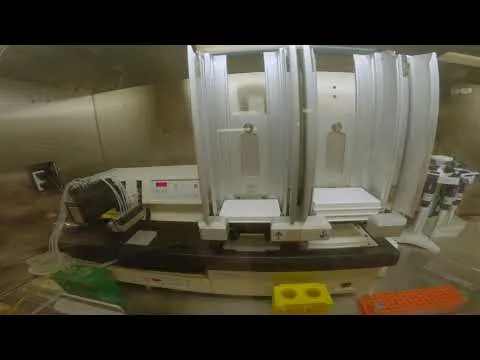
(2022) MCB 182 Lecture 2 - Functional genomics 
Discover the fascinating world of functional genomics with MCB 182 Lecture 2 - Functional genomics. This course offers an in-depth exploration of the latest advancements in genomics, including siRNA, site-directed mutagenesis, CRISPR/Cas9, and more. Delve into the intricate mechanisms of double-stranded break repair pathways and editing systems, and learn how genome-wide CRISPR screens are revolutionizing the field. With topics like gene ontology and gene set enrichment analysis, this course is perfect for anyone interested in unraveling the mysteries of genomics. Don't miss out on this opportunity to expand your knowledge and stay at the forefront of scientific discovery. ▼
ADVERTISEMENT
Course Feature
![]() Cost:
Cost:
Free
![]() Provider:
Provider:
Youtube
![]() Certificate:
Certificate:
No Information
![]() Language:
Language:
English
![]() Start Date:
Start Date:
2022-09-28 00:00:00
Course Overview
❗The content presented here is sourced directly from Youtube platform. For comprehensive course details, including enrollment information, simply click on the 'Go to class' link on our website.
Updated in [September 25th, 2023]
We considered the value of this course from many aspects, and finally summarized it for you from two aspects: skills and knowledge, and the people who benefit from it:
(Please note that our content is optimized through artificial intelligence tools and carefully reviewed by our editorial staff.)
What skills and knowledge will you acquire during this course?
During the MCB 182 course on Functional Genomics, students will acquire the following skills and knowledge:
1. Understanding of siRNA: Students will learn about small interfering RNA (siRNA) and its role in gene silencing and regulation.
2. Site-directed mutagenesis: Students will gain knowledge about the technique of site-directed mutagenesis, which allows for the specific alteration of DNA sequences in order to study gene function.
3. Double-stranded break repair pathways and editing systems: Students will learn about the various pathways and systems involved in repairing double-stranded DNA breaks, as well as the editing systems used for genetic modification.
4. CRISPR/Cas9: Students will acquire a comprehensive understanding of the CRISPR/Cas9 system, a powerful tool for genome editing and gene regulation.
5. Genome-wide CRISPR screens: Students will learn about the application of CRISPR/Cas9 technology in conducting genome-wide screens to identify genes involved in specific biological processes or diseases.
6. Gene ontology (GO): Students will gain knowledge about gene ontology, which is a standardized system for categorizing genes based on their biological functions, cellular components, and molecular processes.
7. Gene set enrichment analysis (GSEA): Students will learn about the technique of gene set enrichment analysis, which allows for the identification of biological pathways or gene sets that are significantly enriched in a given dataset.
Overall, this course will provide students with a comprehensive understanding of functional genomics and the tools and techniques used in studying gene function and regulation.
Who will benefit from this course?
This course on functional genomics will benefit individuals interested in genomics research, molecular biology, genetics, and related fields. Specifically, it will be beneficial for:
1. Researchers and scientists: This course provides in-depth knowledge and understanding of functional genomics techniques and tools such as siRNA, site-directed mutagenesis, CRISPR/Cas9, genome-wide CRISPR screens, gene ontology, and gene set enrichment analysis. Researchers and scientists working in genomics and molecular biology will gain valuable insights into these techniques, enabling them to design and conduct experiments more effectively.
2. Geneticists: Geneticists studying the functional aspects of genes and their impact on traits and diseases will find this course highly relevant. It covers topics like double-stranded break repair pathways and editing systems, which are crucial for understanding gene function and manipulation.
3. Biotechnologists: Professionals working in the field of biotechnology, particularly those involved in genetic engineering and gene editing, will benefit from this course. It provides a comprehensive overview of CRISPR/Cas9, a revolutionary gene editing tool, and its applications in functional genomics.
4. Bioinformaticians: Individuals working in the field of bioinformatics, specifically in genomics data analysis, will find this course valuable. The topics of gene ontology and gene set enrichment analysis provide insights into analyzing large-scale genomics datasets and extracting meaningful biological information.
5. Students and academics: Students pursuing degrees or courses in genetics, molecular biology, or related disciplines will find this course beneficial. It offers a solid foundation in functional genomics, equipping them with essential knowledge and skills for future research or academic pursuits.
Course Provider

Provider Youtube's Stats at AZClass
Discussion and Reviews
0.0 (Based on 0 reviews)
Explore Similar Online Courses

Optom - Eyewear Design Geek! How can one become an #EyewearDesigner ? OOLS 14th June 2020

keep the toyota hybrid battery in balance ( Master Class Level Lesson )

Python for Informatics: Exploring Information

Social Network Analysis

Introduction to Systematic Review and Meta-Analysis

The Analytics Edge

DCO042 - Python For Informatics

Causal Diagrams: Draw Your Assumptions Before Your Conclusions

Whole genome sequencing of bacterial genomes - tools and applications

Centre for Structural and Functional Genomics

Functional Genomics in KBase Webinar - 8 April 2020


Start your review of (2022) MCB 182 Lecture 2 - Functional genomics